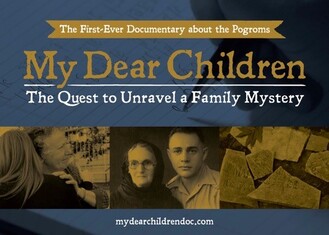 I finally had the opportunity during lockdown to watch a documentary that I’d been wanting to see for a long time. My Dear Children, a 2018 film by director and co-producer LeeAnn Dance, tells the personal and heart-rending tale of a family separated by thousands of miles as a result of pogroms during the Russian Civil War. Central to the story is Feiga Shamis, a mother who strives to protect her 12 children from the turbulence and violence around them. The pogroms of 1917-1921 were far more terrible than any of the anti-Semitic violence that had gone before, with a death toll estimated anywhere between 50,000 and 250,000, and up to 1.6 million injured, attacked, raped, robbed, or made homeless in the largest outbreak of anti-Jewish violence before the Holocaust. The number of individual pogroms is estimated at more than 1,200. Feiga’s 16-year-old son was killed during one of these, while her husband – like my own great-grandfather – died during the typhoid epidemic of 1918-19. “We overheard them saying they should kill all the Jewish children so the Jews would die out,” Feiga wrote. It was time to plot her escape. With her older children married off or sent to the US, she fled to Warsaw with the four youngest, where she placed two of her children – eight-year-old Mannie and 10-year-old Rose – in an orphanage, a fairly common practice at the time. “I thought the children would be safer in the orphanage,” she wrote, “so I took them there.” From Warsaw, the two children were selected as part of a rescue effort by Isaac Ochberg, a Jewish South African philanthropist, who managed to bring to safety nearly 200 Jewish orphans from his former homeland. At great personal risk, he travelled around Eastern Europe collecting children from orphanages and bringing them to Warsaw—to the orphanage where Feiga had placed her children. Only later did Ochberg learn the children’s mother was alive. When Feiga learned of the plan, she faced a heartbreaking decision—keep the children with her, or let them go, to a place half a world away where she would probably never see them again, but where she was assured that they faced a better future. She chose to let them go. My Dear Children is based on a long letter that Feiga wrote to Rose and Mannie after she had emigrated to Palestine in 1937 to live with one of her older daughters. She gave it to Mannie on the one occasion they met after his and Rose’s departure for South Africa. As a young soldier in the South African army, Mannie was posted to Egypt, from where he took a week’s leave to visit his mother. Tragically Mannie cut short his week-long visit to just a single day, with he and his mother unable to connect to one another. Mannie never read his mother’s letter, suppressing a past that was too painful to contemplate. For the rest of his life, Mannie would agonise over why his mother had sent him away, and neither he nor his sister Rose would ever talk about their childhood back in Russia. It wasn’t until after Mannie’s death that his widow had the letter translated from Yiddish into English, printed as a small book, and distributed among members of the family. The scenes that Feiga witnessed during the Civil War and her experiences during that time resonate deeply with the recollections of my grandmother, documented in my book A Forgotten Land. In particular, Feiga wrote about becoming a black-market vodka trader, bartering vodka for food to keep her family alive. My grandmother too was a black-market trader at this time, dealing in food, and later gold, as the sole breadwinner for her grandparents, siblings and cousins. It is clear from her writing that Feiga remained racked with guilt and suffering over her decision to allow her children to leave for South Africa, and she wrote the letter as a justification and explanation for what she had done. In 2016, Mannie’s daughter Judy and granddaughter Tess set out on a trip to Poland and what is now Ukraine, hoping to find answers as to why Mannie refused to talk about his past and what drove Feiga to the choice she made. They found a landscape virtually erased of its Jewish past. “The Holocaust did not happen in a vacuum. The pogroms of 1917-1921 should be seen as a precursor to the greater tragedy just 20 years later. My Dear Children shows the consequences of unchecked, or worse – officially sanctioned – anti-Semitism, and given the increasing incidents of anti-Semitism today, this story remains relevant today. Feiga’s story is not unique. Nearly 80% of the world’s Jewry can trace their roots to Eastern Europe, thus Jews around the world share Feiga’s story. Many likely have no idea they do so.” LeeAnn Dance said in an interview for the Washington Jewish Film Festival in 2018. For more information about My Dear Children, click here www.mydearchildrendoc.com
0 Comments
Leave a Reply. |
Keeping stories aliveThis blog aims to discuss historical events relating to the Jewish communities of Ukraine, and of Eastern Europe more widely. As a storyteller, I hope to keep alive stories of the past and remember those who told or experienced them. Like so many others, I am deeply troubled by the war in Ukraine and for the foreseeable future, most articles published here will focus on the war, with an emphasis on parallels with other tumultuous periods in Ukraine's tragic history. Archives
March 2024
Categories
All
|
 RSS Feed
RSS Feed
